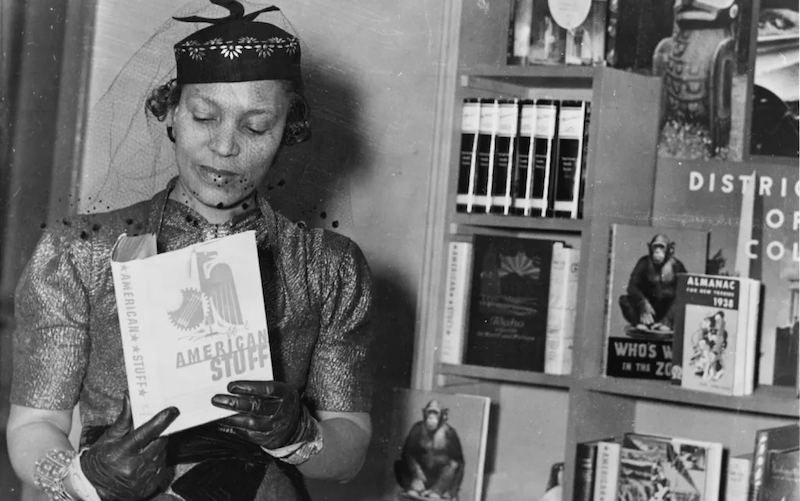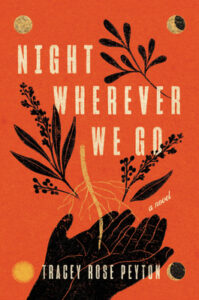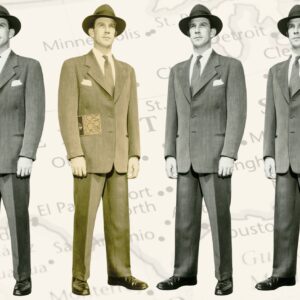
How Zora Neale Hurston’s Study of Hoodoo Helped Me Grieve
Tracey Rose Peyton on Making Peace With Her Father
“There must be feasts for the spirits, for some once a month, for some every three months. Use plenty of perfume at these feasts.”
–Zora Neale Hurston, “Hoodoo in America”
*Article continues after advertisement
I never drink alone. Whenever the desire strikes, I go to the kitchen and pull out two glasses. The first is a stemmed wine glass—the lone survivor of a four-piece set, a housewarming gift from three states and umpteen apartments ago. I pour a few ounces of bourbon into it (drink purists, be damned) and set it on a shelf next to my father’s funeral program. On its cover is a cropped photo I took of him, an image from my brother’s wedding reception years prior.
The precise moment was not long after the wedding, when members of the family were posing for photographs in front of a paisley red curtain. Two people are taking pictures at the same time. The official photographer and me, with my dinky SLR, a few feet away. My parents stand close together, but their eyes look in opposite directions. My mother smiles with her mouth closed, gazing at the photographer, but my father’s brown eyes are fixed on me.
I pause now in front of the photo, looking at it, through it. The glass of brown liquid glimmering in the light. It’s a quiet moment between my father and I, though he’s in one realm, and I in another. I tell him, “Thank you,” for a million unspecified things that need not be named. I can’t hear his voice, but I don’t need to. For me, this small moment is enough.
*
When he died in 2011, we weren’t close. For many years, our relationship was strained. Or rather, I was the strained one—cold and standoffish, while he was baffled by my consistent lack of regard. Why I often left rooms the moment he entered them, how often I answered his questions in the fewest syllables possible, why I left home for college and only returned annually, for a week at a time, then sped away as quickly as I could.
To know my father was to know someone equal parts bluster and bite. He was gregarious, whip-smart, and generous, with a natural-born skepticism of authority in all its forms. A patriarchal figure for his younger brothers and nephews, a caretaker for his aging mother, a loving father to me and my older brother. Conversely, he could be stubborn, chest-thumping and domineering, full of the bravado that men of his era used to make their way in a world that tried to crush them at every turn. He struggled with alcoholism and depression, though we never named them as such, and even now, to call them that, feels like too easy a categorization, a ready-made box to drop this story inside of. I resist that box.
His decline was sudden and swift, a spiral of early on-set dementia, a tracheotomy that left him unable to speak, and soon after, hospice, where he died a few days after Christmas. We moved through the rituals, of calling relatives, writing the obituary, and making arrangements in a robotic haze. And while the requisite day of mourning was fine—complete with Mahalia Jackson, drunken relatives, and the unexpected guest appearing at the repast, it didn’t offer me any peace.
What came in the wake of his passing wasn’t grief. It was guilt. Shame.
What came in the wake of his passing wasn’t grief. It was guilt. Shame. My anger at him had cost us a lot of years. Now, a decade after his passing, I realize how small and petty I was. Yet, I don’t regret all my anger. The parts of me that felt cowardly, weak, and perpetually scared were fortified by this rage. It made me sharp and bold where I wouldn’t have been otherwise. What I regret is the grudge I carried for much too long, the need to “be right,” to punish him with my absence. And now, it was too late to change any of it.
*
Years after his death, when I was working on my novel, one of my favorite research wormholes was African-American spirit ways—in this case, hoodoo, also known as conjure or root work. Not to be confused with voodoo/Vodun, hoodoo is a mix of spiritual practices that some deem a folk magic, others a religion, with all the tensions both designations can imply.
Zora Neale Hurston’s documentation of these practices in “Hoodoo in America” include long lists of prescriptions for nearly every human dilemma—from court scrapes and landlord issues to romantic break-ups and betrayals. There’s something so comforting to me about these prescriptions. That someone created a list of simple orderly procedures to resolve what’s often chaotic and confusing in life. It’s a window into what our ancestors worried about and the conflicts they dealt with, big and small.
It’s a window into what our ancestors worried about and the conflicts they dealt with, big and small.
This research soon led me to current practitioners, who have moved the mom-and-pop storefronts of yesterday to the internet, where they’ve built thriving online communities. Such groups chart a fascinating through-line of the evolution of these practices from the historical accounts of enslaved African-Americans to Hurston’s anthropological work in the 1920s, to stories my mother and her siblings share about growing up in Georgia decades later, and now this cornucopia of online spiritualists offering readings, fixed candles, spiritual baths, and other paraphernalia at the click of a button.
After months of research, bits of these practices began to trickle down into my own life. I started doing small things—setting aside a portion of a cooked meal or an extra glass of water. I made a honey jar to try to alleviate my fearsome self-doubt. Little by little, it felt like a door was opening, like I had permission to communicate with my dead, to honor them, and be with them. And best of all, to consider that the door between they and I was not a sealed one, that whatever had been left unsaid didn’t have to remain so for all of time.
*
“To avoid fusses and fights in the home, burn salt… first thing Monday morning.”
–Zora Neale Hurston, “Hoodoo in America”
*
Fathers often forget that their size, the depth of their voices can make them scary, make their anger frightful and monstrous in the eyes of their children. And I was an easily scary kid. It worried my mother—this softness in me. Not hardy enough for this world, for the body I was born into—black, female, and bone-thin. I was always told I needed to be more—larger, louder, harder, thicker.
Like him, I had a love-hate relationship with authority. I loved school and the legibility of it, but I hated the powerlessness of childhood, always being told when to sit or stand, when to get up or go to bed, how to be and when to be it. And he seemed the ultimate authority. I thought him oppressive, overprotective, an ogre. I didn’t understand until later how lucky I was. So many girls I grew up with had no such hedge when predators came calling.
At times, I wonder now if my cowardice needed him to be a monster, a tension to push up against, to move in opposition to. The most urgent reason to venture out into the cold sharp unknown, if for nothing else, then to prove him wrong, to put space between my body and his.
Now, I’m trying to mend the gulf I spent over a decade making. I can’t explain how—but these small glasses of alcohol or portion of food makes the gap between us feels shorter—psychically, spiritually, temporally.
I don’t pretend to get all the rituals correct. I’m not exacting in the hour or the lunar cycle, or much else. True practitioners would scold my laziness here, my lack of attention to detail, the absence of a daily practice, but I can’t help feeling like a fixation with perfection in this area would be one more thing in the way. Another reason to delay, to put off, to leave the rift fixed and unchanging. I’m well versed in those things already. The showing up, the act of reaching out, the remembering feels like the true aim for me. And what I receive in return—this small bit of contact, this glimmer of his presence—is plenty.
Some might say what I’m experiencing during these moments is a fiction of my own making, something I tell myself to feel better about the true cost of holding grudges and chasing dreams far away from home. Maybe so, but writing fiction has taught me that facts are only one part of the story. How something feels can be just as true, and the meaning we make of details, of memories, of absences can offer us more than we deserve.
_____________________________

Night Wherever We Go by Tracey Rose Peyton is available now from Ecco.
Tracey Rose Peyton
Tracey Rose Peyton received her MFA from the Michener Center for Writers at University of Texas-Austin. Her short fiction has been published in Guernica, American Short Fiction, Prairie Schooner and elsewhere, and her short story, “The Last Days of Rodney,” was recently selected by Jesmyn Ward to appear in Best American Short Stories 2021. Night Wherever We Go is her first novel, available now from Ecco.



















